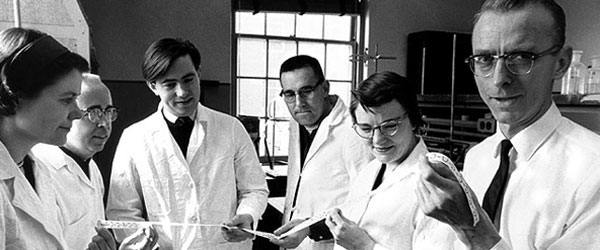You’ve had a rough day at the bench, putting in long, grueling hours with no pay-off. Your fantasy of running away to join the circus starts sounding rational. The last thing on your mind is to add to your already overloaded schedule. Yet as crazy as it sounds, participating in science outreach really improved my bench work (and kept me away from carnie life). Here’s how it helped me.
1. Science outreach can give you a MUCH needed confidence boost.
You don’t usually realize how much you know until you try to explain something to someone. Believe it or not you possess expert knowledge, though you might not feel that way.
As you progressed in your academic career, you became increasingly surrounded by people who were just as academically gifted as you. Now in grad school, you are surrounded by experts and forget that you’re part of the larger group called humanity. The big picture is that you are a top scientific mind. I think this lack of perspective really affects our performance, motivation, and focus at the bench.
To get back valuable perspective, go talk to people who aren’t experts. You wouldn’t believe what a confidence booster it is to have a difficult question from someone and be able to answer it (in nauseating detail!). This little confidence boost may be just what you need to get back in the ring with that Western Blot.
2. Science outreach can help you remember why you science.
If you’re struggling right now, chances are you don’t feel as lovey-dovey with science as you used to. You used to be so close. Passionately in love. Now, you sort of want to set it on fire – like when your plate washer goes haywire on your expensive ELISA.
Do what some couples do when the passion has cooled a bit – go on a date! Take science’s hand and romp around in a museum where yet again your eyes can gleam in wonder. Talk to someone about why your science is cool and worth doing. Watch that same gleam appear in their eyes. It’s like drinking from the spring waters of the mythical Hippocrene and being filled with divine inspiration. Oh, THAT’S why you’re doing this for the 20th time. Discovery!!
It’s easier to see the worth of repeating it over and over until it finally works if you remember why you came here in the first place. Rekindle the love! I found it was the number one thing to get me back to the bench after a fail.
3. Science outreach can provide short breaks that increase productivity.
You likely feel a little guilty every time you leave the lab or spend a weekend on yourself. That’s something you’ll focus on when you get out of this place. Except that end may never come (especially if you stay in academia).
Take a brief break to give a talk at a high school or visit a museum and tell the public what you do. Chances are there are ways you can do science outreach that are pretty close by. If you take a break, do something fun and active, and then head back to the bench, you’ll be more focused and maybe even a little more optimistic about the results (see #2).
4. Science outreach can expose you to new perspectives.
I know it seems cliché, but sometimes kids (and adults) have amazingly fresh perspectives. You’re a scientist. You know things. But, it’s easy to have routine ways of looking at things. Some outside perspective can be just what you need to get creative at the bench.
Like talking to your best friend about relationship troubles, talking to people who don’t know a thing about the prevailing views of your research means they can offer really insightful ideas. Maybe they will even inspire a new research project or new ways of looking at your data.
5. Teaching for science outreach double-checks your understanding.
This is the flipside of #1. Sometimes you really don’t know the gaps in your knowledge until you try to explain something. Turns out you really don’t understand the difference between monoclonal or polyclonal antibodies. Maybe you don’t really know why you use a certain kind of tissue homogenization for extracting protein but another for RNA.
Understanding these details might get you out of a rut. When you sit down with someone and try to explain exactly how you do something, these gaps appear in front of you like nice little “File cannot be found” messages – just a friendly check that you are clear how your bench work…works. It might be just the thing to point out something you’ve overlooked.
Hopefully, you feel a little better imagining reaping all of these benefits. If you can squeeze in time to do a little science outreach, I feel pretty confident you won’t regret it.




